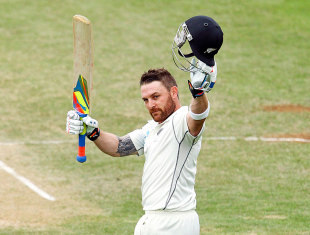New Zealand v India, 2013-14

|
|||
|
Related Links
Tour and tournament reports : New Zealand v India, 2013-14
Matches:
New Zealand v India at Wellington
Series/Tournaments:
India tour of New Zealand
Teams:
India
| New Zealand
|
|||
At Wellington (Basin Reserve), February 14-18, 2014. Drawn. Toss: India. Test debuts: T. W. M. Latham, J. D. S. Neesham.
When Brendon McCullum was joined by B-J. Watling shortly after lunch on the third day, New Zealand were 94 for five in their second innings, 152 short of avoiding an innings defeat. Nearly two days later, New Zealand were still batting, McCullum had scored their first triple-century in Tests, and a series of records - many of them unchallenged in a generation - had been obliterated. Their recovery went down as one of the best salvage operations in all cricket.
By the time the weary Indians got to bat again, late on the final morning, New Zealand had secured the draw that clinched the series, to follow their 2-0 victory over West Indies in December. For only the second time, and the first since 1989-90, when they beat India and - in a one-off game - Australia, they had won two Test series in a home summer. New Zealand cricket had rarely felt so upbeat.
Fresh from his double-century at Auckland, McCullum went even better here, and began the final day on 281. As spectators clamoured to get in, long queues snaked up the road outside the Basin Reserve - a sight usually reserved in New Zealand for sporting contests involving the All Blacks. A spine-tingling sense of occasion took hold, as the crowd oohed and aahed every run. Twenty-three years earlier at the same venue, Martin Crowe had fallen for 299 to the last ball of a Test against Sri Lanka, likening the experience to "climbing Everest and pulling a hamstring in the last stride". Now, everyone outside India, and doubtless many within it, were willing McCullum to reach the summit.
Five singles and three leg-side fours took him to 298 - via an edge on 293 that fell just short of Dhoni - before a boundary to third man off Zaheer Khan brought the crowd to their feet. Two balls later, McCullum poked at Zaheer and was caught behind; he had batted almost 13 hours, faced 559 deliveries, and hit 32 fours and four sixes. It was only the second Test triple-hundred made in a team's second innings, after Hanif Mohammad's epic 337 for Pakistan at Bridgetown in January 1958.
Having reached the middle at 52 for three in the 18th over, he was finally departing in the 200th, with New Zealand 625 for seven, and the Indians now trailing by 379. There were a couple of chances along the way: Kohli dropped him on nine at silly mid-on, and Ishant Sharma put down a return catch on 36. But these were quibbles.
The circumstances surrounding the innings were as important as the numbers. Normally cavalier, McCullum had adapted to the demands of his team. On 114 at the end of the third day, having become the fourth New Zealander - after John Wright, Crowe and Stephen Fleming - to pass 5,000 Test runs, he remained pragmatic about the task in hand. "We have a lot more ground to cover tomorrow," he said, before unwittingly underselling himself.
"To be honest we probably need a double-century to keep in this game." He owed a debt, too, to Watling. In eight and a half hours together, the pair put on 352, surpassing the Test sixth-wicket record - set by Sri Lanka's Mahela and Prasanna Jayawardene in 2009-10 against India - by one run; it was also New Zealand's third highest partnership for any wicket. Such was India's desperation for a breakthrough that Dhoni, whose negative field placings, especially on the fourth morning, attracted plenty of unfavourable comment, surrendered the gloves and pads to Kohli, and bowled the first over after tea.
Watling's 124 followed five catches with the gloves in India's first innings. New Zealand's eventual declaration at 680 for eight was their highest total and a Test record for a team's second innings - in both cases passing 671 for four in Crowe's match. Almost unnoticed, Neesham chipped in with 137 not out, the highest score by a No. 8 batsman on debut. He had spent 123 overs waiting in his pads.
It was all a far cry from the first innings, when - missing Ross Taylor, who was attending the birth of his second child - New Zealand struggled to 192 on an emerald tinged strip after Dhoni had won his seventh consecutive toss. Ishant Sharma, who would later be nursing an analysis of none for 164, took a Test-best six for 51. India's 438 then established a 246-run lead. After Dhawan made 98, Rahane - batting at No. 7 after Sharma had gone in as nightwatchman - hit a maiden Test century and added 120 for the seventh wicket with Dhoni. New Zealand's decision to drop leg-spinner Ish Sodhi, and gamble with five seamers, paid few dividends.
They were quickly in trouble again, as Zaheer Khan helped reduce them to 94 for five. But then came McCullum and Watling - and, eventually, a declaration that set India a purely notional 435 from 67 overs. They slipped to 54 for three, but Kohli avoided further embarrassment on a benign pitch, scoring his sixth Test hundred. Like the game's three other single centurions, he was completely overshadowed by McCullum.
Man of the Match: B. B. McCullum.

